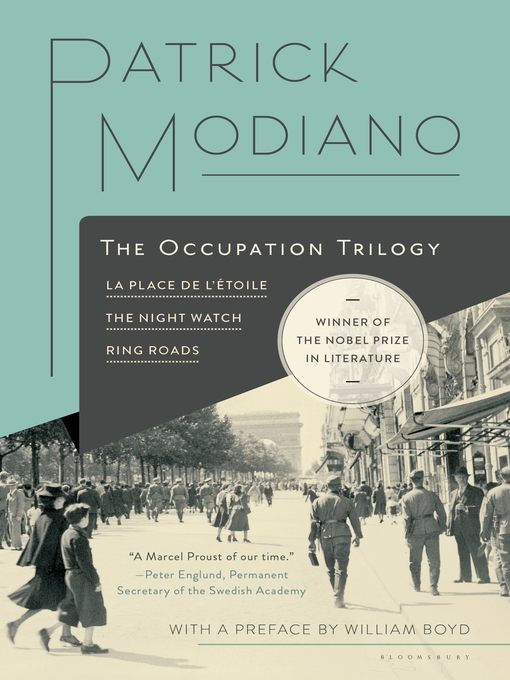
The Occupation Trilogy
La Place de l'Étoile – The Night Watch – Ring Roads
کتاب های مرتبط
- اطلاعات
- نقد و بررسی
- دیدگاه کاربران
نقد و بررسی

September 1, 2015
Until he was awarded the Nobel Prize in Literature in 2014, Modiano was not widely known here, but American readers can now start catching up. This volume comprises his first three novels, known collectively as the "Occupation Trilogy," which investigate the ongoing impact of Germany's occupation of Paris during World War II. La Place de L'Etoile (1968) features French Jew Raphael Schlemilovitch, who was born just after the war (like Modiano) but in a mad rant confuses chronology and presents himself as "the official Jew of the Third Reich." Thus does Modiano sober us up to deep-rooted French anti-Semitism and Jewish self-hatred. In The Night Watch (1969), never before published here, though it appeared in Great Britain in 1972, the protagonist informs on the Resistance for the French Gestapo and on the police for the Resistance and explains his amoral shiftings by saying of his putative biographer, "He won't understand the first thing about this story. Neither do I." Neither do we, as Modiano here demonstrates his powerful penchant for endings that (sometimes realistically, if not always satisfactorily) aren't endings. In Ring Roads (1972), a young man who finds his long-vanished, increasingly servile Jewish father, mutters "I'd be better off thinking about the future." VERDICT Though a lot of background drops out here, Modiano's famously spare style is not entirely in evidence, with the writing feeling positively baroque by comparison. Sometimes over-the-top, these aren't perfect novels, but they are refreshingly (and unsettlingly) unheroic, digging under France's postwar skin to reveal venal behavior, and they raise issues that Modiano continues exploring throughout his work.--Barbara Hoffert, Library Journal (BH)
Copyright 2015 Library Journal, LLC Used with permission.

September 7, 2015
Nobel Prizeâwinner Modiano's first three novels, collected in this appealing omnibus, deftly demonstrate how the Parisian upper class functioned during the Nazi occupation of France in WWII. The novelsâ"La Place de l'Etoile" (appearing in English for the first time), "The Night Watch," and "Ring Roads"âfocus on a class of people who often treated the German occupiers as a temporary nuisance and an opportunity to increase their wealth. Aristocratic but scholarly Schlemilovitch, the main character of "La Place de l'Etoile," is kicked out of his lycee, not for being Jewish but because he is a profligate lothario. An older gentleman named Lévy-Vendôme somehow convinces Schlemilovitch to procure young French girls from the countryside to be sold into the white slave trade. Schlemilovitch finds the girls, but can't bring himself to turn them over to Lévy-Vendôme. Schlemilovitch's Jewish identity eventually causes him difficulty when he runs afoul of officers who reach for their truncheons when they hear the word "culture." "Ring Roads" chronicles a son's desperate struggle to locate his father amid the war's chaotic aftermath. In "The Night Watch," Modiano exposes the corrupt and dangerous side of the French auxiliaries who joined the Gestapo, personified by the torturing inquisitors Monsieur Philibert and the Khedive. Modiano's sharp depiction of daily life and characters, both in and out of the patrician social class during the war, justly solidifies his reputation as one of the world's leading chroniclers of the human condition.

July 15, 2015
"I know the life stories of these shadows is of no great interest to anyone, but if I didn't write it down, no one else would do it": three early novels by Nobel Prize-winning French author Modiano (Suspended Sentences, 2014, etc.) that look back to the years of the Nazi occupation. In terms of storytelling, the first novel in the trilogy, La Place de l'Etoile (originally published in 1968)-the title refers to both the Parisian plaza and the requirement that Jews wear stars of David as identification-is the least conventional. It begins in the middle of things: "This was back when I was frittering away my Venezuelan inheritance." Who is "I," and what is this Venezuelan treasure? Working backward into the story, Modiano recounts the histories, invented and real, of an alter ego named Raphael Schlemilovitch, who, in various guises, is revealed to be a Jew who has nothing but admiration for the German occupiers of France: "My God, how handsome were the youths on the far side of the Rhine!" The homoerotic yearning is widely shared: as the story moves along, Schlemilovitch becomes less and less attractive, even as his collaboration is shown to be commonplace. Yet it's also subtle; the presence of the Germans encourages all sorts of bad behavior, including the pornographic impulses of an aristocrat who wishes no less than "to prostitute French literature in its entirety." It's a strange adventure, reminiscent at times of the Celine of Castle to Castle. In the second novella, The Night Watch (1969), announcing a favorite theme, Modiano works a puzzle of unfixed identities, its narrator a double agent of whose sympathies we can never quite be sure. "I hereby authorize my biographer to refer to me simply as 'a man, ' and wish him luck," Modiano writes, meaningfully. The third, Ring Roads (1972), extends that puzzle across generations as it depicts more or less ordinary people simply trying to survive. Fans of Maurice Chevalier won't be pleased, but Modiano's admirers will find this early work fascinating.
COPYRIGHT(2015) Kirkus Reviews, ALL RIGHTS RESERVED.

























دیدگاه کاربران